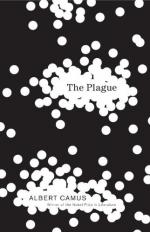|
|
The Plague Part 4 (Section 1)
September and October are months to "mark time" in Oran--the plague continues to do its deadly work, and rain settles over the city. The townspeople are now exhausted from doing battle with the disease, and sick of hearing about it on the radio and in the newspapers. Rieux hears that his wife's condition has worsened, and admits to Grand that their long separation is wearing on him. He has also realized that although he is a doctor and his job is normally to cure, the job now is merely to diagnose. A case of the plague means inevitable death.
The one person in town who is not afflicted with indifference and exhaustion is Cottard, whom Tarrou has recorded observations of in his diary under the heading: "Cottard and his Relations with the Plague." Cottard is cheerful to have company in his misery. Before the plague, he suffered alone with the guilt over whatever crime it was he committed. When Tarrou suggests that only with a clean conscience can one really feel connected to other humans, Cottard absolutely disagrees. The one way of making people hang together, Cottard says, is to "give 'em a spell of the plague."
Tarrou describes the nights he and Cottard went out together, and how the people of Oran are now decidedly in search of fast and luxurious pleasure. They spend lavishly for expensive goods, leave big tips at restaurants, and display their passion on the streets. Cottard feels a sort of pity for the townspeople, who are alienated from each other because they are afraid of getting infected if they get to close to another. Tarrou explains:
"... though they have an instinctive craving for human contacts, [they] can't bring themselves to yield to it, because of the mistrust that keeps them apart." Part 4, page 199
Tarrou's notes end with a story about an evening he and Cottard went to the opera house. One of the actors seemed to be performing in an exaggerated way--actually, he was dying from the plague on stage. In the middle of a duet, he dies dramatically, and the crowd rises to leave, at first calmly, but then pandemonium sets in as all flee for the exits. Walking out with Cottard, seeing all of the left-behind belongings of those who had rushed out, Tarrou feels that the scene was a perfect illustration of the townspeople's lives those days.
Rambert's getaway plans progress a bit: he moves in with Marcel and Louis so that he will be ready to leave when the going is good, and spends several days in the house with the boys' reserved and religious mother. Finally, all is set for Rambert to leave the next day, at midnight. Rambert goes to look for Dr. Rieux, and finds him in the hospital. There, before Rieux and Tarrou, Rambert quietly announces he's not leaving--he'd be ashamed to do so. Though Dr. Rieux says there is nothing shameful in wanting to return to happiness and love, Rambert explains:
"Until now I always felt a stranger in this town, and that I'd no concern with you people. But now that I've seen what I have seen, I know that I belong here whether I want it or not. This business is everybody's business." Part 4, page 210




